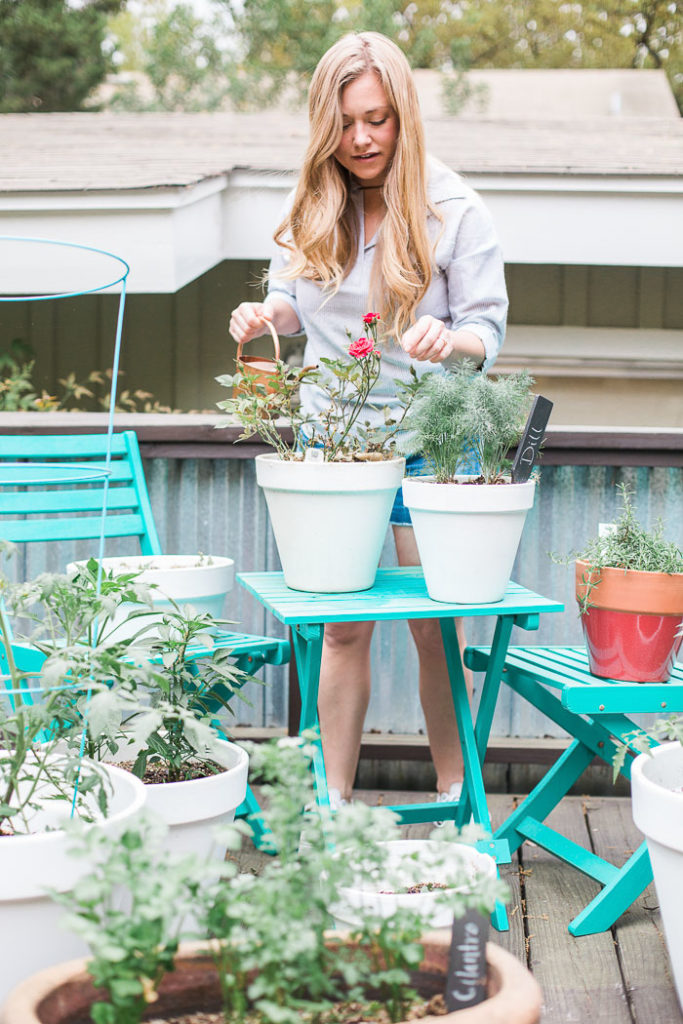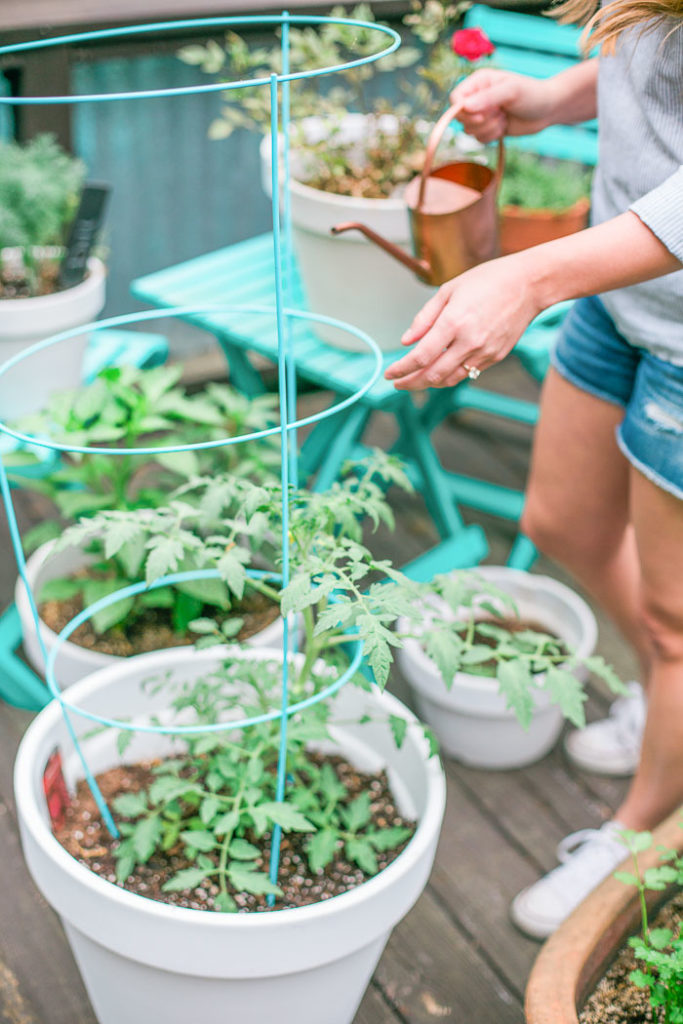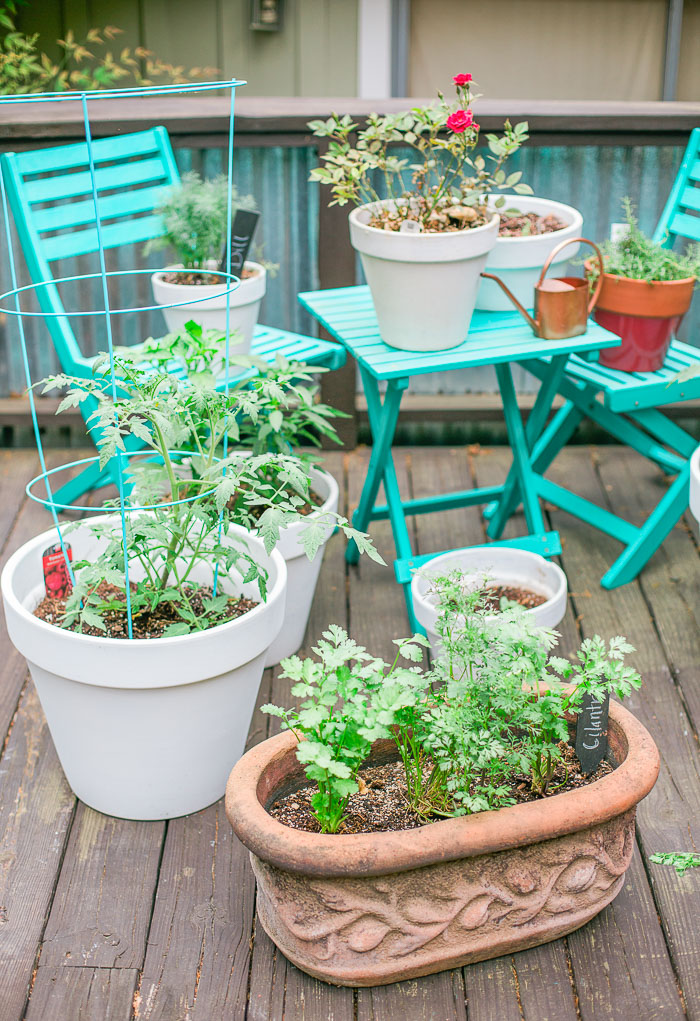 I’ve been growing my own herbs for a few years now! I’ve learned a lot during those years and now I feel much more seasoned and comfortable with my little plant babies. The first time, ok several times, I tried growing my own herbs I failed miserably. I had dreams of a cute pinterest-y herbs growing right in my kitchen! Well, let’s just say that you must have some kind of magical kitchen to grow herbs there. Here is what I’ve learned from growing my own herbs so you don’t make the same mistakes!
I’ve been growing my own herbs for a few years now! I’ve learned a lot during those years and now I feel much more seasoned and comfortable with my little plant babies. The first time, ok several times, I tried growing my own herbs I failed miserably. I had dreams of a cute pinterest-y herbs growing right in my kitchen! Well, let’s just say that you must have some kind of magical kitchen to grow herbs there. Here is what I’ve learned from growing my own herbs so you don’t make the same mistakes!
There are certain, specific things that plants need. We all know this intuitively but I think we often see images spread all over our screens that make us think that plants can live and thrive in places that really weren’t made for them. Like tiny jars on a dark kitchen wall haha! I say this because I’ve tried it and failed. And failed again.
Here are the 10 tips I wish I would have known when I started my first herb garden!
 10 Tips For Your 1st Herb Garden
10 Tips For Your 1st Herb Garden
1. Herbs need bigger pots than you think- Yup, herbs need room to let their roots spread out. Usually about 18 inches. Aka way too big to hang from your kitchen wall most likely. Also, herbs usually are busting out of their pots when you buy them. So be sure to repot them within a week or so of purchasing them.
2. Squirrels might be your #1 enemy- Squirrels will see your pots of rich soil and fresh herbs as their own little sandbox to play in. They will want to dig up and eat whatever they can. So be on the lookout and shoo them away. A cat or dog will do the trick too haha! You can try nets or chicken wire as well. I have also great success by planting pepper plants next to the plants I am trying to keep the squirrels away from. The squirrels had been getting all my tomatoes but once I put my pepper plants next to them it kept them away. The squirrels got one bite of the hot peppers and never came near any of my plants again!
3. Water, water, water- Herbs are not succulents. I repeat, herbs are not succulents. They need regular water. Usually, once a day in the Texas heat. If you get a lot of rain then maybe a little less. Herbs that are growing will need a lot more water than herbs that are dormant. Check the soil and look at the leaves, the soil should be moist and the leaves supple. If the leaves start to wilt, give them more water. But also make sure the soil can drain. Place rocks in the bottom of the pot and make sure there is hole. Otherwise, water can collect at the bottom of the pot and cause root rot. Also important to note, water the base of the plants and try to keep the water off the leaves. Water in the morning or evening, water droplets on the leaves can burn the leaves in the hot sun. Droplets on leaves during the cooler times like morning and night will attract thirsty bugs. So try and water the base of the plant and the water will go straight to the roots where the plant needs it!
4. Yes, you need to prune- Part of growing healthy plants is cutting them back. If you use a lot of herbs in your cooking, this shouldn’t be a problem! If you find yourself with lots of extra basil or cilantro, simply give it to a neighbor, dry it or cut it off and let the leaves incorporate back into the soil and give nourishment back to the plant. Pruning will help healthy leaves grow but allowing the leaves to get air and sunlight and not get too crowded. For example with basil, when the leaves get way too big, they begin to lose some of their flavor. So be sure to clip them when they are in their prime! Snip leaves right where the leaves connect to the stalk and make a clean cut or pinch. If you rip them off, it will leave a cut in the stalk open to infection.
5. How and when you should let your herbs go to seed- When herbs flower, that means they are going to seed. Their leaves will turn bitter or lose flavor because the plant is entering a new developmental phase and focusing on making seeds to it can ensure its survival to the next stage of life. This usually happens when it gets too hot for the herbs. For cilantro, this happens around 75 or 80 degrees Fahrenheit, basil it may happen after several days of high 90s. A way to help prolong the edible phase of the herbs is to pinch off buds before they begin to bloom. The sooner the better! Pinch or clip them off the moment you see them. I’ve done this and been able to keep my herbs going all summer long! Well not, cilantro, Texas summers are just too hot but basil and others you can keep going!
6. It’s all about that sunlight- Herbs need lots of sunlight to produce their tasty little leaves. I’ve never had success growing them in a sunny window to be honest. They really need to be outside in my opinion in order to grow and thrive. However, they will dry out and burn up if they get too much sun, especially that piercing afternoon sun during the super hot part of summer. So pay attention to your plants and make sure they get at least fours a day of direct sunlight, preferably in the morning.
7. To fertilize or not to fertilize- I have successfully grown herbs without using fertilizer. If herbs have nutritious soil, they can grow with little else than a little water from you. My advice is to buy a good potting soil for your herbs. If you choose to use fertilizer, make sure you get the correct one! Otherwise, you might be giving your plant fertilizer to make it bloom rather then have leafy green growth!
8. Slugs, bugs and other creatures- I’ve lost, and almost lost, many a basil plant to slugs during those hot summer nights. They just love the basil. A tip for slugs is put a bowl of beer out near the plant. They are attracted to the beer and will get a little tipsy and never make it to the basil. White flies are also attracted to basil and other more tender leafed plants. Keeping the water droplets off the leaves will help with this. The real key to warding off pests like these is to…
9. Pay attention to the details- yup, just keep a close eye your plants! Watch for signs of distress, turn over the leaves and take a close look. Are there black bugs everywhere? Are the edges of the leaves turning yellow? Check your plants, ask yourself these questions and then do your research and treat appropriately.
10. Know what you grow- Each herb has its own personality. Basil likes hot summers, parsley likes cool mornings and warm afternoons, sage can keep going all year under the right conditions! Some herbs need a little more sun, some a little more shade. The key is not to treat all plants the same and get to know them a little and give them some TLC.
And before you know it, you’ll have a thriving herb garden of your own! Have you ever grown and herbs? What are your favorites?

Leave a Reply